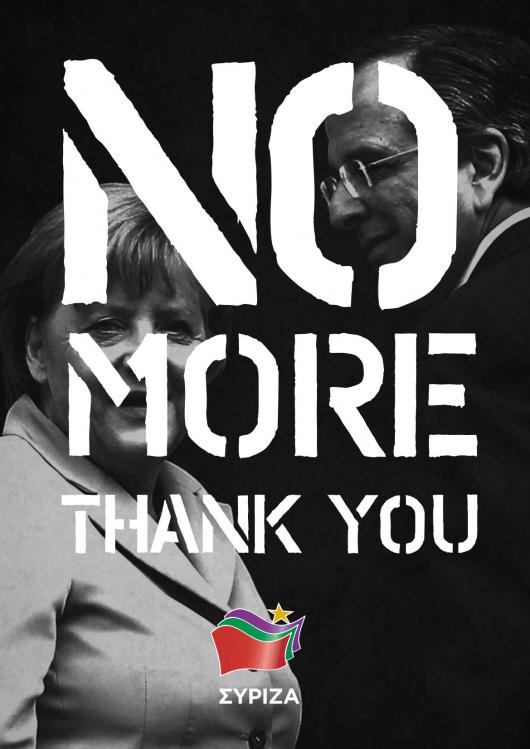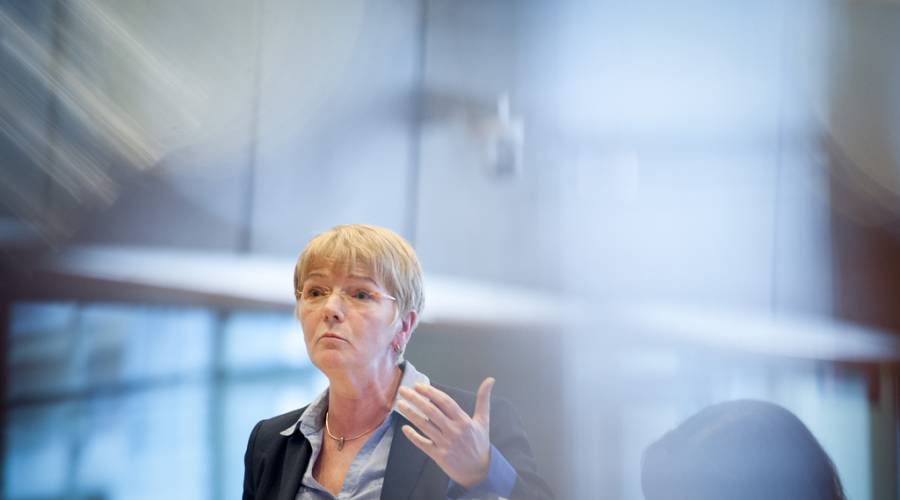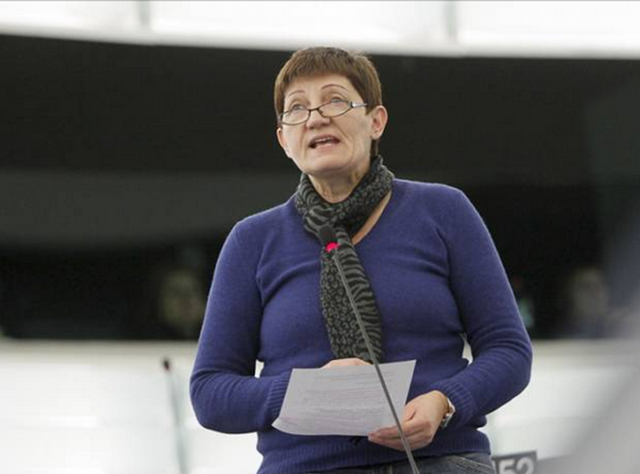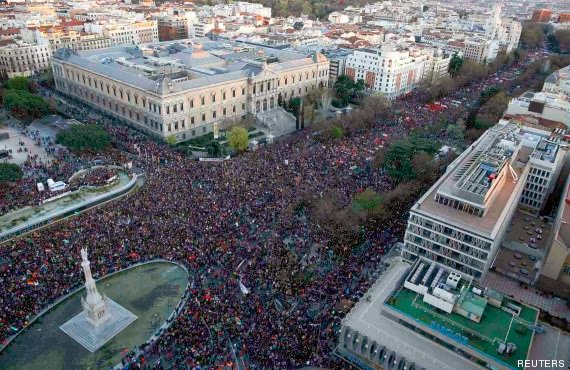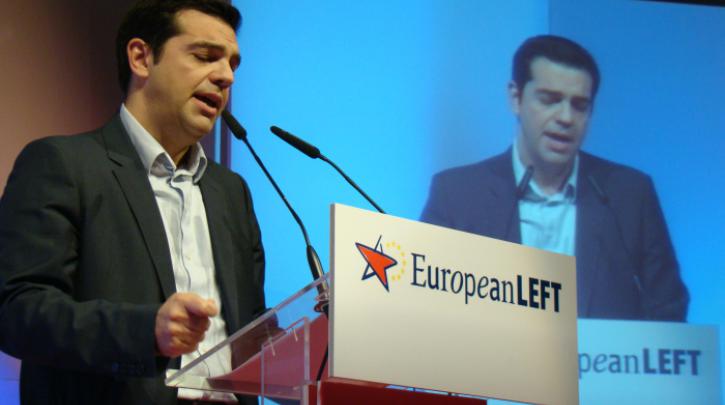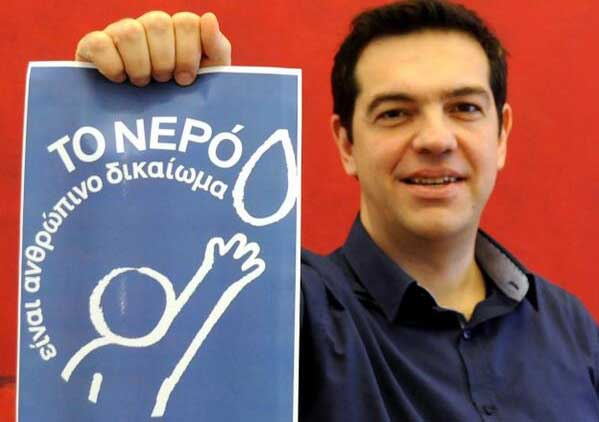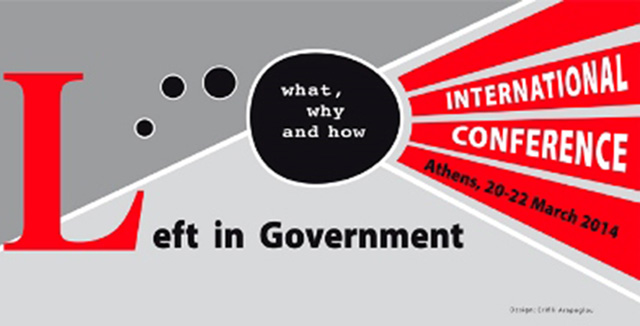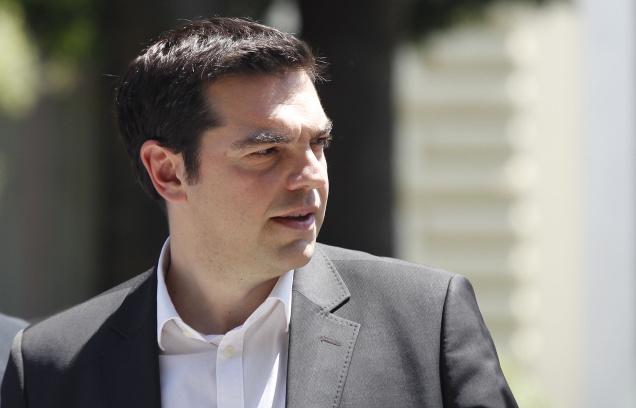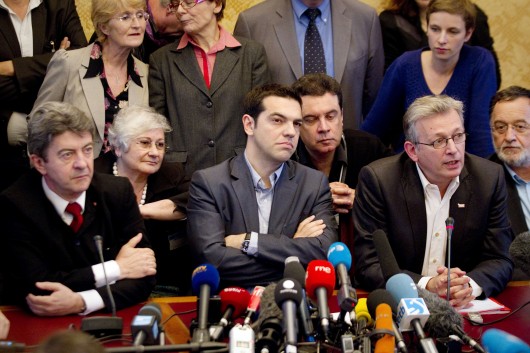- Details
-
Category: #EP2014
-
Published: Monday, 24 March 2014 13:50
With the neoliberal attack on the European periphery in full scale, but also the impending European election on the horizon, the Left is bracing itself for a more dynamic role in the European Union. According to opinion polls the European Left group (GUE/NGL) is expected to form the third largest group in the European parliament, affecting broader policy changes and coordinating the resistances to neoliberalism and the rise of the far right. But strikes, protests and criticism are not the only means to actually change the course of things to come in the continent. Instead, the takeover of power is necessary, a prospect highly likely in the case of Greece and a future possibility for more political forces in other EU countries as well.
The preparations necessary to stand up to the challenge of governance was the focus of the conference, “Left in Government – why, what and how?” that took place on March 20-22, 2014 in Athens, Greece. The three-day event attracted a diverse group of academics, politicians and policy-makers from the Left from both North and South America, as well as numerous European countries. The full list of speakers can be seen here. They all stressed the fact that Alexis Tsipras’ candidacy for President of the European Commission symbolizes the vision of the Left for Europe, one that is based on development, labour rights, democratic institutions and social cohesion. The international conference was organized by the Rosa-Luxemburg Stiftung and with the cooperation of the Nikos Poulantzas Institute and transform!europe.
Uniting behind Alexis Tsipras and SYRIZA, the speakers recognized not only the momentous opportunity for a Left government in Europe to start halting the neoliberal division of Labour but also that SYRIZA can be a paradigm for change for the Left in all 27 members of the European Union. Professor of Political Science, Leo Panitch, co-editor of Red Pepper magazine, Hilary Wainwright and Member of the European Parliament, Liêm Hoang-Ngoc, and members of the Icelandic Left, among others discussed the necessity of having internal structures in place when transitioning from opposition to running the State, and shared their experiences of having defining role in their national governments.
Also in attendance were SYRIZA MP and Vice President of the Hellenic Parliament Yiannis Dragasakis, Euclid Tsakalotos, MP and co-author of, “Crucible of Resistance: Greece, the Eurozone and the World Economy” and economist and Director of the Nicos Poulantzas Institute, Haris Golemis.
The speakers focused especially on the importance of capacity building and professional development of parties’ members. Leo Panitch gave the example of the Left in Bolivia, who found themselves at a disadvantage for not being properly organized to run the State upon being elected into power. Another pressing matter for the Left, and particularly for SYRIZA, is how to prepare members of the party—across the board—for their roles in government, while maintain activity on the grassroots level. As echoed by numerous speakers, if a party loses touch with needs and expectations of the populace, the vision of the Left cannot be transformed into a sustainable reality.
As expected, the political climate in Greece, and the meteoric rise of SYRIZA, was an area intense focus. Alexis Tsipras presented his vision for a new Europe, stressing the importance of creating a political system based on democracy, transparency and accountability, as well as increased attention to civic-mindedness. To succeed, such a system must be supported and demanded by, both politicians and citizens alike.
Seeking to put an end to the destructive neoliberal narrative of austerity and the poisonous fallacies of the North-South divide and to focus instead on cultivating sustainable economic policies for growth, Alexis Tsipras reiterated his commitment to strengthening Europe and promoting cooperation in the Eurozone. Acknowledging the need for cohesive reforms nationally, he discussed key highlights of his economic and social program for Europe, calling for a “New Deal” in Europe that would not only help ease the austerity-driven humanitarian crisis, but also stimulate growth in all countries decimated by austerity.
“We are living in an era, where everything national is European and vice-versa. That doesn’t mean the weakening of the nation state, but it means that while solutions are provided in the European scale, decisions are taken in the national level. Europe is the field for social, class and political struggle of the Left”.
- Details
-
Category: #EP2014
-
Published: Thursday, 20 March 2014 14:23
The Rosa-Luxemburg-Stiftung, with it’s Brussels and Athens Offices, is organizing an international conference in co-operation with the Nicos Poulantzas Institute and transform!europe, taking place from 20 – 22 March in Athens: “Left in Government – why, what and how?“
With politicians and academics from Greece, Iceland, France, Germany, Slovenia, Argentina, Canada, Norway, Ecuador and other countries, we will analyze the necessity and significance of left governments. Bringing their international experience, they will discuss and give answers to questions such as:
• Why is it so critical to have left governments in Greece, Europe and the whole world?
• What are lessons learned from the experience around the world?
• What are the concepts, the program and the visions of a Left government?
The conference is open to the public. There will be simultaneous translation.
We will be pleased to welcome you, to discuss and enrich the dialogue on themes such as:
Discussion 1: Left government and democracy: the necessary breakthrough – with whom and how?
(Thursday, March 20, 18:30, Auditorium “9.84”, Pireos 100, Gazi)
• Yannis Dragasakis, Greece – SYRIZA MP
• Makis Kouselis, Greece – Professor for Political Science, University of Athens
• Leo Panitch, Canada – Research Professor for Political Science, York University
• Anej Korsika, Slovenia – Initiative for Democratic Socialism
Moderation: Walter Baier, Austria – Coordinator of transform!europe
Discussion 2: Productive transformation, new social subjects
(Friday, March 21, 10:00, Auditorium “9.84”, Pireos 100, Gazi)
• Alekos Kalyvis, Greece – Member of SYRIZA Central Committee
• Yannis Eustathopoulos, Greece – Economist-Researcher
• Gabriel Colletis, France – Professor for Economics, University of Toulouse 1
• Harald Wolf, Germany – Die Linke, Senator for Finance, Technology and Women in the Local Government of Berlin, 2002-2011
• Daniel Chaves, Uruguay – Fellow of the Transnational Institute, Senior Lecturer in Political Economy at the International Business School, Amsterdam
Moderation: Haris Konstantatos, Greece – Political Scientist, Member of the Editorial Group of “Oikotrives” Magazine
Discussion 3: Administration, decentralization, local politics
(Friday, March 21, 14:00, Auditorium “9.84”, Pireos 100, Gazi)
• Rena Dourou, Greece – SYRIZA MP
• Gabriel Sakellaridis, Greece – Economist, Member of SYRIZA Central Committee
• Kerstin Kaiser, Germany – Die Linke, Member of the Brandenburg Parliament
• Thodoris Dritsas, Greece – SYRIZA MP
• Álfheiður Ingadóttir, Iceland – Former Health Minister, Chairwoman for the Left Green Group in the Nordic Council
Moderation: Michalis Spourdalakis, Greece – Professor for Political Science, University of Athens
Discussion 4: Looking to the future: education and culture
(Friday, March 21, 18:00, Auditorium “9.84”, Pireos 100, Gazi)
• Michel Duffour, France – Member of Parti communiste français
• Björg Eva Erlendsdóttir, Iceland – Coordinator of the Nordic-Green-Left-Alliance
• Antonis Liakos, Greece – Professor for History, University of Athens
• Theano Fotiou, Greece – SYRIZA MP
Moderation: Aristeides Baltas, Greece – Chairman of the Nicos Poulantzas Institute, Professor emeritus, National Technical University of Athens
Discussion 5: Towards a new economic model in times of capitalistic crisis
(Saturday, March 22, 11:00, “Akropol” Theatre, Ippokratous 9-11)
• Yiorgos Stathakis, Greece – SYRIZA MP
• Steingrímur J. Sigfússon, Iceland – MP and former Chairman of the Left Green Movement, Minister of Finance 2009-2013
• Alan B. Cibils, Argentina – Professor for Political Economy, National University General Sarmiento
• Luka Mesec, Slovenia – Coordinator of the Initiative for Democratic Socialism
Moderation: Elena Papadopoulou, Greece – Economist, Scientific Advisor to SYRIZA Parliamentary Group
Discussion 6: A left government in today’s Europe
(Saturday, March 22, 18:00, “Akropol” Theatre, Ippokratous 9-11)
• Alexis Tsipras, Greece – Chairman of SYRIZA Parlamentary Group
• Liêm Hoang-Ngoc, France – Member of the European Parliament
• Steingrímur J. Sigfússon, Iceland – MP and former Chairman of the Left Green Movement, Minister of Finance 2009-2013
Moderation: Klaus Sühl, Germany – Head of RLS Brussels Office
- Details
-
Category: #EP2014
-
Published: Tuesday, 18 March 2014 14:17
Our international partners have much to lose if they continue
to pursue the current austerity policy
Alexis Tsipras the leader of Syriza Party in Greece is a big hope of the new European left and a candidate for the presidency of the European Commission. Two years ago, his party almost seized political power in the country which was incredibly quickly changed by the tough austerity measures – as if a war was raging in Greece – into a third world country where democracy and the Greek (as well as European) way of life is quickly vanishing. If parliamentary elections were held tomorrow in Greece, Syriza would be a certain winner. But the Greek left is incredibly divided, so the question remains if Syriza would be able to form a government. Thirty-nine year old Tsipras, the president of the only new European left-wing party which can actually expect to seize political power, is optimistic. As a candidate of the European Left for the president of the European Commission in this year’s European Parliament elections which will be held on 25th May, he visited Ljubljana last Saturday (1/3/2014)and greeted the participants of the United Left’s founding congress. (This interview has first appeared in the newspaper Delo)
Interview by Bostjan Videmsek – Chronos Magazine
After six years of crisis, Greece is devastated on many levels. The country has changed very quickly and in such a radical way that the conditions it found itself in remind us of the way countries change during a war. But the neoliberal experiment continues and in the meantime the crisis became a state of affairs: where is the breaking point? When will people finally become fed up with those who are ruining their lives and their dignity?
For the last six years we have lived in a state of continuous recession and austerity. It did not happen only in Greece, but Greece was a Guinea pig of neo-liberalism in the European Union, and we suffered the most, by far. Nothing like this has ever happened in Europe before. Our GDP is now 25 % lower than it was before the crisis. The number of the unemployed is the highest in the EU: the unemployment rate is almost 30% and the youth unemployment rate is almost 60 %. More than three million people [of ten million] are in the middle of a humanitarian crisis. Many are without health insurance and have no access to health care services. Not for themselves nor for their children. The situation is getting worse every day.
The question is what we can do to stop this extremely negative trend. We are in a very difficult position but the solutions are there. The solution is most certainly not the continuation of the austerity policy. The «cure» for the crisis in Greece was worse and it caused more damage than the crisis itself. We must give up this cure immediately and stop the austerity policy! We must abandon the austerity memorandums which were signed between several consecutive Greek governments on one side and the EU, Germany and international financial institutions on the other. We must stop the troika! We must start the programmes aimed at growth and reconstruction of the Greek economy’s production base.
Greece is an EU member state. We are one of the chains holding together the common European currency. After German chancellor Angela Merkel – during her last visit of Bruxelles – said that the eurozone would have collapsed if the EU hadn’t decided to adopt a rescue programme for Greece, it should become crystal clear to everyone that the European Union wasn’t trying to rescue Greece; it was trying to rescue the euro. The eurozone. And its banks.
Greece would be saved if a radical left-wing government came to power with the people’s support and if the troika’s mandate ended. In other words: we must say it was enough, we will not continue with austerity measures and forceful policy. We want an alternative growth and progress programme. We will make our own choices during the implementation of this programme since, after all, the EU is a democratic union. If we succeed, it will be the decisive moment for large political, social and economic changes in Europe.
There is not much time left. Austerity devastated a large part of Southern Europe and it doesn’t look like anything is about to change. On the contrary. The Neoliberal dogma has become almost a natural state of affairs for many people. How does Syriza plan to seize political power now that it has reached record ratings? Do you expect early elections in Greece? Can any big changes take place at all while the current voting and political system still exists?
Do you want to know what we plan to do when we seize political power?
Well, you have to win the elections first …
Absolutely!
After the elections held in June 2012 when Syriza almost won, most people realized that all the threats and lies that were being spread about us by political opponents and rivals as well as Greek and foreign media were totally unjustified. They claimed that in case we won, people would lose their jobs, savings and companies. They said we would lose everything we had and the entire system would collapse. But in fact, this is all happening because of austerity and the measures taken by our government! The entire media system was literally blackmailing people with these fabrications. They did everything they could to prevent Greeks from voting for Syriza. But when the election results were published and when the government of Antonis Samaras started taking decisions completely different from the ones promised during the election campaign, people realized they were victims of blackmail. They realized they were given false promises. And that even the threats were false. The situation in Greece became drastically worse because political power in the country was seized by Samaras’ New Democracy together with Pasok. These two parties are by far the most responsible for the current situation in Greece. They pretended to be the savers of Greece when, in fact, they destroyed the country and people’s lives.
I am sure that most voters are now ready to make the step they didn’t take in June 2012. After the next elections – whenever they will be held – we will become a majority party in the parliament [the victorious party in the Greek parliament is entitled to additional 50 parliamentary sits]. The problems we will have to face are enormous, there is no doubt about it. We will have to work very hard because the situation in the country will only get worse. We will come to power in a country with a destroyed production base and with an enormously high unemployment rate. Greece is a country in a deep humanitarian crisis. Therefore we will have to cooperate with other political parties and civil society movements.
If you win the elections, what will be your first message to Brussels and Berlin?
There are no easy solutions. We have been saying that again and again. Our priority will be to prevent destruction and catastrophe. Therefore we intend to drive a hard bargain with our partners in Bruxelles. We would like to find the «collective» solution that would suit all sides. The situation in the European Union and in the eurozone is extremely complicated. The Greek rescue programme has not only collapsed on the economic and social level, but also on the political level. Before the austerity memorandums were signed, the Greek public debt was 120% of the GDP. Today, after years of austerity measures, it is 175%. And it continues to grow. In 2015 it will probably reach 205% of the GDP. It is absolutely clear to anyone that a crisis cannot be dealt with when public debt is that high, and everyone knows Greece will never be able to return that amount of money. The only solution is to write off a large portion of the debt.
We will propose to the creditors that they renounce 50-60 % of the Greek debt. It will be an appropriate solution for a deeply indebted country and the creditors. If our public debt continues to grow, soon there won’t be any solutions to take and we will have to declare bankruptcy. In this case, the creditors would lose all their money. But if we are able to reach an agreement, everybody will be a winner. Greece will be able to stand upon its feet and get an opportunity to pay off the rest of its debt. A write-off is not really a radical solution and history records several examples. The international community wrote off most of Germany’s debt at the London conference in 1953 because the country had been devastated during World War II. Approximately 60 %. They reached an agreement that Germany would pay the rest of the debt if its economy will start to grow.
True, that … but in Germany, the Marshall Plan was already being carried out, and (above all) the United States of America which occupied a large portion of Germany after the war were very much interested in the recovery of German economy. Can we say something like that about Greece?
The Marshall Plan was not being carried out only in Germany, but in many other parts of Europe. And Europe now needs a similar conference which should also adopt a moratorium on the debt payment. It could lead to a European »New Deal« which we all desperately need, especially for the financing of growth and investments on Europe’s periphery. This could be the right package to beat the crisis. Economy would soon start to grow and we would all benefit from it. I think it is a very realistic expectation, and this is our proposal to the creditors. Is there any other proposal anywhere to be seen? What is the proposal of the current EU leadership and the German hegemony inside the EU? They propose and carry out a division of Europe. They are dividing Europe to budget surplus countries and to budget deficit countries. To north and south. To the rich and the poor. This is not how the future of Europe should look like! This situation has nothing to do with the basic European idea founded on solidarity. But to present our proposal, we first need the mandate from the Greek people.
What we suggest is the only real solution for the entire Europe. I think Mrs. Merkel is a realistic politician. Up until now, none of her European partners has presented her with a serious counterproposal. When things will go too far, she will have to start negotiating and looking for a new, effective solution. Germany and the European Union don’t want to see the eurozone collapse because everyone would lose in this case.
But the authors of austerity policy won’t give up their project just like that. They have created it with the help of international financial institutions and local political elites. The project of changing Southern Europe into a region of cheap labour force and «free economic zones» with limited labour and human rights, i.e. the project of changing Southern Europe into a region of «Asia inside Europe», was actually quite a successful one. You mentioned that several times during our previous conversations. Why would they want to change anything?
They admitted themselves that they made mistakes. And that they made several mistakes in Greece.
It is true that the representatives of the International Monetary Fund (IMF) said that. But it sounds more like an «acceptable self-criticism» which really doesn’t say anything.
IMF representatives even mentioned in their report that they made a «series of mistakes». The European Parliament declared that the troika had no legitimacy to act. It seems rather strange: they admit their mistakes and claim they have not chosen the right medicine for our illness, and at the same time they keep putting pressure on Greece to fulfil their demands and to follow the guidelines of austerity memorandums… [laughter]
I am convinced that for Greece – and the crisis in general – there can be no technocratic solution. The solution can only be political. What counts in politics is the balance of power; not emotions. This is the only way we can change anything. We will not convince our international partners with talks about solidarity, we would only be able to do that by showing them clearly that they have much to lose if they continue to pursue the current austerity policy. When Angela Merkel realizes what she can lose, she will change her way of doing things.
Germany has made a lot of money with the eurozone crisis and the crisis in the European peripheral countries, and Mrs. Merkel didn’t have to change her way of thinking. Everyone is saying and writing about German and European taxpayers having to pay for the rescue of Greece although it is a big lie. The taxpayers are paying for the rescue of banks – 98 percent of all the bailout money went directly into the black holes of the banks and to pay the debts. Only 2 percent of all rescue packages went into the real economy. In the meantime, Germany made a lot of money with its government bonds – approximately 40 billion euros in the last four years. And during this period, Germany and other countries supporting the rescue mechanism only paid 800 million euros for helping countries in troubles. The crisis was a very profitable project for Germany, and it is clear its representatives are not willing to finish it just yet. But they also don’t want to destroy the euro which has brought them so much money and they don’t want to return to marks. That is why at the end of the day we will be able to discuss these problems.
The price that Greece had to pay during the years of crisis was not just economic, social and political. The crisis undermined democracy as well. Not only because of the dreadful rise of the neo-Nazi Golden Dawn party and brutal violence against immigrants, but also because of the downfall of democratic institutions and values. Greece has changed in many ways. How can the «sedimentation» of freedom be stopped? How can you fight against the negative social trends?
You are correct. The first victim of the crisis and austerity memorandums was democracy itself. But the hope remains: with radical political changes and strong people’s mandate for the new government, a new political atmosphere will surely be created in Greece. The new government will have to include the people, and that would be a big evolutionary step forward. If we seize the political power in the country, we will democratize institutions. We will make decisions together with the people and not without them as other governments did before us. This applies to all the most important decisions we intend to take. Therefore there will be many referendums in Greece in the future, and this is how we intend to verify if the people still trust us. We will ask them to participate in the decision making process.
But to have political power and to have actual influence are two different things in Greece. Even when we form the government, a great deal of power will stay in the hands of the capital. By this I mean in the hands of big corporations, oligarchs, ship-owners, bankers, media owners… We will become involved in a big conflict, and we have to prepare ourselves for that situation. In the conflict, we will need the help of the people, which is why I have to say it again: if we want to achieve radical political changes, we need a political mobilization of the people. We will need it every day not just on the election day.
After many years of protests which didn’t change practically anything and after many years of being on a road to the third world, the Greek are exhausted. Many of them have deliberately distanced themselves from politics which represents something utterly disgusting to them. They are not apolitical, but anti-political. They have found refuge in Greek civil society movements which are by far the most active and progressive in Europe. How do you plan to convince this critical mass of people who are in great anxiety about their future?
This is very true. People are tired and angry. But hope is a basic human need, which is why all of us are trying to find the exit from this difficult position. Syriza’s task is to give people a realistic hope for the future once again.
People are fed up with everything. The problem is they don’t believe that big changes can really happen. The Greek are much more reluctant to act now. They have been very active in the last four years, especially in the first two years [2010 and 2011]. Now their hopes for the changes can be redirected into politics, into the possibility of political change. All the anger and disappointment can stimulate them to take part in the elections. And these people will definitely vote for Syriza. But if the people who will decide to vote for us out of disappointment think that their problems will be over once they cast their vote for Syriza, we will be in a big trouble. It is not just their vote that we need. We need their energy, active participation, cooperation, mobilization. And we need them every day. Not just before the elections and during the elections, but after them as well.
Have you ever had a feeling in the last few years that Greece is on the edge of a big social conflict if not even something worse?
No. I don’t believe that the situation was ever that bad. The social conflict is there, of course, but it is not that big. People still protest a lot but not as much as they did before. They are in the streets. They did everything in their power but the government didn’t listen to them. On the contrary, the authorities sent the police against them and used violence to stop the protests.
The violence continues. Not so much by the police as by the media. It is psychological violence. Everybody knows that austerity measures and the related policy are wrong. But the mass media are repeating over and over again that these measures are the right thing, the government policy is correct and that we are moving in the right direction. It is incredible how passionately the mass media are willing to support the government of Antonis Samaras and the New Democracy. That is why people are even more disappointed: not only are the media supporting the government, they are also creating a feeling that there is no other option available. That there is no alternative. That we will have to suffer until we die and there is nothing we can do. That’s just how it is. At the same time they accuse everybody else who is trying to think differently that they have no suggestions of how to deal with the crisis. This is a very peculiar situation. The atmosphere in Greece would be best described by saying that people are depressed. They put all their hopes in political changes: the latest public opinion surveys show that the majority of Greeks think Syriza would win the elections if they were held in the near future.
So they see you as some kind of antidepressants?
Ha, ha, that would make a good slogan… The problem is that the same majority of people who think we would win don’t believe that we would be able to bring about any changes.
Because to have political power doesn’t mean to have real influence in Greece, as you said earlier?
That’s one of the reasons. But in this case it’s not about a »theoretical approach«, it’s about the emotions. About feelings. It clearly shows how deeply disappointed everybody is. The media have actually managed to persuade them that there is no other way but austerity and that our fate is sealed. That we have to suffer.
I am a big optimist. We will win the elections. But big problems lie ahead. We will have to convince people to start participating in the political process because to cast a vote doesn’t mean much. If Greece gets a left-wing government, people will have to participate in politics more than ever before.
You won’t be able to govern the country on your own: how is it, then, possible to unite the Greek left-wing parties which hold the unofficial record of being the most divided in the world? After all, one left-wing movement is always applying its posters over the posters of another, the third or the seventh left-wing movement or a party: is the dictatorship of small narcissisms undermining (not just) the Greek left?
This is where Syriza is a success story. We have united thirteen different left-wing movements. We are a fundamentalist party which is able to unite people with different points of view [laughter]. It is true especially in the era of great oppositions and total fragmentation of the left-wing movements. We were the only ones who said that we are not interested in the divisions of the left-wing movements. That we want to cooperate since only a united Greek left can do something important. The Communist Party of Greece opposed us. Their approach is well-known: everybody close to them is their worst enemy, even worse than the real right-wing opponents. They accuse other left-wing parties and movements of many things and behave very aggressively towards them. We decided not to play their game, not to answer their accusations and not to attack them back. Furthermore, we will always be ready to present them with our proposals for cooperation. Not in the same party, of course, but in common initiatives and actions. Our enemy is not on the left, it is on the other side. Next to the disappointment of voters with other parties, this was the main point that helped to create the Syriza phenomenon – namely, the ability to connect. And, of course, because we are determined not just to protest and criticize, but also to govern the country.
In Slovenia, the situation among left-wing political movements is not entirely different. The difference is we don’t have Syriza…
But you managed to form a coalition of the united left which follows the Syriza paradigm. I think this is a reason to be optimistic. This is something that evokes hope. To me and to everybody in Syriza this was a very pleasant surprise. It would be nice if in all European Union countries which started the »healing« process with neoliberalism, people would form movements which oppose such approaches and present alternatives.
There are plenty of opportunities for that. Especially after the last review of the disastrous consequences of the austerity policy in Southern Europe. I am convinced that great political, social and economic shocks – just like the ones in life – always bring about new opportunities and open new space to act. The space which has to be filled. You have to be in the right place at the right time. Namely, we live at a time when political parties have big problems with people’s participation. The parties which have traditionally represented the middle class have stopped doing this. This is true especially for the social democrats who have come very close to the conservative parties in the last ten years in Europe. There are no differences between them. They have included the neoliberal agenda in their programme. This created space for the alternative left-wing policy. It needs to be filled with a clear programme which will change people’s lives for the better. I will suggest to my Slovenian colleagues who may not enjoy a lot of public support at the moment that they should become a political force which will say to the people it wants to govern the country. A force which will change things for the better.
Source CHRONOS MAGAZINE
